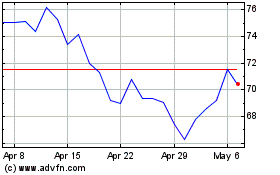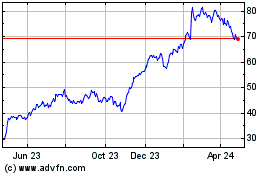Chief of Uber Eats Is Leaving As It Exits Some Markets -- WSJ
February 27 2020 - 3:02AM
Dow Jones News
By Sarah E. Needleman
This article is being republished as part of our daily
reproduction of WSJ.com articles that also appeared in the U.S.
print edition of The Wall Street Journal (February 27, 2020).
The head of Uber Technologies Inc.'s food-delivery business is
leaving the company, a departure that comes as the unit works to
exit markets where it isn't a dominant player in a bid to boost
profits.
Uber on Tuesday said the departing executive, Jason Droege, will
be succeeded at Uber Eats by the head of its international rides
business, Pierre-Dimitri Gore-Coty. Mr. Gore-Coty joined the
company in 2012.
Uber didn't say why Mr. Droege, who came on board the San
Francisco company in 2014 to spearhead new ventures, was leaving.
Mr. Droege will be available until June to help with the
transition, Uber said. Uber couldn't immediately be reached for
additional comment.
Eats has helped Uber boost its revenue, but has weighed on its
bottom line. The unit posted an adjusted loss before interest,
taxes, depreciation and amortization of $461 million for the three
months ended Dec. 31.
To stem such losses, Chief Executive Dara Khosrowshahi has been
pulling Eats out of markets where it isn't among the top two
food-delivery services. Last month Uber agreed to sell its Indian
food-delivery unit to a local rival. Last year the company also
discontinued food-delivery operations in Vienna and pulled out of
South Korea.
Uber has also been seeking to shore up its finances possibly by
merging with a competitor such as DoorDash Inc. or Postmates Inc.
So far, though, discussions haven't resulted in any deals.
Mr. Khosrowshahi has said the Uber Eats exits are helping put
the company on a faster path to profitability. On an earnings call
earlier this month, he said he now sees the company being
profitable on an adjusted Ebitda basis by the end of this year.
Previously he said the company hoped to reach that mark by the end
of 2021.
Uber has said it expects pricing in food delivery, its
second-biggest business after ride-hailing, will become more
reasonable and the discounts and promotions will begin to fade. The
company is already starting to keep more money from each
meal-delivery transaction. Adjusted net revenue, which excludes
driver incentives and referral bonuses for Eats, was $1.38 billion
in 2019, up 82% from a year earlier.
Uber still faces challenges ahead. Its core ride-sharing
business is under regulatory scrutiny in some of its most lucrative
markets. In California, which accounts for about 9% of Uber's gross
bookings, a new law known as AB5 may require the company to
reclassify its drivers as employees, which would dramatically raise
costs. And in London, which makes up about 5% of its ride bookings,
the company was stripped of its license to operate in November, a
ruling by local authorities it is appealing.
--Preetika Rana contributed to this article.
Write to Sarah E. Needleman at sarah.needleman@wsj.com
(END) Dow Jones Newswires
February 27, 2020 02:47 ET (07:47 GMT)
Copyright (c) 2020 Dow Jones & Company, Inc.
Uber Technologies (NYSE:UBER)
Historical Stock Chart
From Mar 2024 to Apr 2024

Uber Technologies (NYSE:UBER)
Historical Stock Chart
From Apr 2023 to Apr 2024
